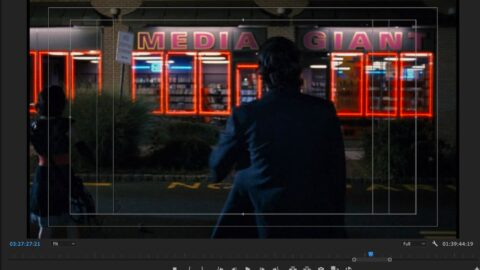A love letter, a cultural autopsy and a historical chronicle all at once, Alex Ross Perry’s Videoheaven traces the rise and fall of the video rental store through a dense, referential collage of film and television clips, interwoven with advertisements and archival news footage. The result is a sober, informative and often poignant portrait of a vanished cultural institution.
Imagine Los Angeles Plays Itself (Thom Andersen, 2003), but instead of wandering the streets of Hollywood, you’re witnessing the birth and slow decline of the marketplace for the very product that the city is most famous for.
Beginning with early depictions of videotape technology in films like Demon Seed (Donald Cammell, 1977) and Videodrome (David Cronenberg, 1983), Perry explores how the VHS cassette — first made commercially available in 1977 — was portrayed as a mysterious, even threatening medium. The cassette is a talisman capable of unleashing danger, sexual awakening or psychological transformation. For a time, the video store itself functioned as a kind of democratic archive: a mom-and-pop-run space where hundreds or even thousands of titles — mainstream, obscure, transgressive, or pornographic— could be freely browsed, chosen and taken home. And the object in your hand could, for better or worse, change your life.
As Videoheaven shifts from the intimacy of indie video stores to the sanitised sprawl of Blockbuster and Hollywood Video, the transformation is palpable. What was once a space of curiosity and possibility becomes awkward, transactional and emotionally sterile — an overlit family gathering spot where personal taste is exposed, and privacy feels increasingly compromised. It’s the kind of busy setting where you might run into an ex, have to explain your rental choices to an annoying acquaintance, or endure the passive judgment of a snarky clerk. The enchantment begins to fade.
The 1990s marked a period when Hollywood increasingly turned to video stores — and the clerks who staffed them — as mirrors for its own self-reflection. In other words, Hollywood began to talk about itself a lot. Actors reappear across time and genre, often in roles that echo or satirise the mythology of the video store employee. David Spade surfaces repeatedly as the archetypal bratty clerk; Matthew Lillard plays a horror-obsessed teen screening Strait-Jacket (William Castle, 1964) to horrified customers in Serial Mom (John Waters, 1994), then reemerges in Scream (Wes Craven, 1996), loitering in a video store with his clerk friend (Jamie Kennedy) — once again, a character shaped, if not entirely warped, by his immersion in genre. Naturally, Randall from Clerks (Kevin Smith, 1994) makes an appearance, loudly ordering porn just to antagonise a customer and her child.
One of the film’s most compelling detours explores pornography and the uneasy relationship American culture has long had with it. Perry highlights the rapid shift in tone, beginning with Body Double (Brian De Palma, 1984) — the first Hollywood film to depict a video store — where the protagonist rents a pornographic tape without hesitation or shame. Jump forward a decade, and the landscape has changed. Through a curated mix of film clips and scenes from prime-time sitcoms like Friends (David Crane, Marta Kauffman, 1994-2004) and Seinfeld (Jerry Seinfeld, Larry David, 1989-1998), Perry reveals how pornography had become both omnipresent and taboo‚ something widely consumed, yet treated as something to be ashamed of. A phantom hiding in plain sight.
Though rooted in a deeply sentimental subject, Videoheaven resists the pull of overt nostalgia. Maya Hawke’s narration is coolly restrained — precise, almost clinical — lending the film a tone of dreamy detachment that deepens its impact. Yet beneath its measured surface, Perry’s nearly three-hour elegy quietly evokes something profoundly human. For those who once roamed the aisles of the video store — often surrounded, as the film notes, by faded Troma Entertainment posters — in search of wonder, solace, or identity, the film awakens a tender, aching sense of loss. Not just for the places themselves, but for the intimacy of choosing a story by hand, in a world that no longer exists.
Editor-at-large Jared loves movies and lives with Kiki in Berlin.

